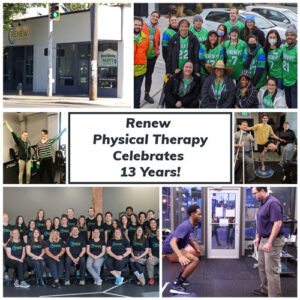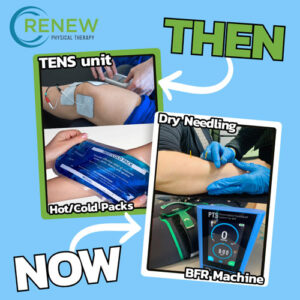
Have you or someone you know experienced a sensation of spinning, dizziness, or feeling off-balance? You may be experiencing vertigo. If you are living with these symptoms, it’s important to seek help to determine the underlying cause and appropriate treatment. We sat down with Matt Godofsky, physical therapist and managing partner at the Renew Physical Therapy clinic in Renton, to learn about vertigo and how it can be treated through physical therapy.
Q. What is vertigo?
A. Vertigo, or BPPV (Benign Paroxysmal Positional Vertigo), is a false sense of movement or spinning sensation triggered by a change in head or body position. This is due to a mechanical dysfunction in our inner ears.
Q. Why do we experience vertigo or dizziness?
A. We function and balance from a complex integration of our vision, sensory information, and our vestibular system. Any disruption or weakness to these systems can lead to dizziness or vertigo. The exact cause of true vertigo (BPPV) is unclear, but research supports an association of head injury or trauma and prolonged immobilization as possible contributing factors.
Q. Is there a difference between vertigo and dizziness?
A. There are many reasons why people become dizzy, unsteady, or off balance as a result of a weakened or impaired vestibular system. Vertigo (BPPV) is typically triggered by head/body movements and lasts less than 1 minute in duration. Other types of dizziness may be a result of medication interactions, impaired vision, lack of sensation, vestibular disorders, cervical whiplash injuries, and generalized normal aging. Non-BPPV dizziness can have a longer duration and be triggered by things other than movement.
Q. How do I know if the dizziness I experience requires additional therapy or treatment?
A. A physical therapist can help diagnose your particular type of dizziness and determine what course of treatment you may need. During the initial exam, your therapist will be able to determine if your dizziness and vertigo symptoms are caused by BPPV or another underlying condition. Renew Physical Therapy has at least 5 therapists across all clinics that are trained and/or have additional certification in treating dizziness, vertigo, imbalance, and other vestibular conditions.
Q. How can a physical therapist help to treat vertigo and dizziness?
A. Following a thorough evaluation, your physical therapist may recommend performing treatment maneuvers to address your vertigo symptoms. These are usually a series of various slow head and body positions that take around 2 minutes to perform. Once BPPV or vertigo is correctly diagnosed, symptoms typically fully resolve after only 2-3 treatment sessions.
Q. What can I do to prevent vertigo and dizziness?
A. Unfortunately, there is no way to completely prevent vertigo or BPPV. However, a vestibular physical therapist will be able to evaluate and provide an individualized plan of care that is specific to each patient.
Q. What is Renew Physical Therapy’s approach to treating patients experiencing vertigo and dizziness?
A. Vertigo/dizziness is something that no one can see or feel except the person experiencing it. This can be difficult to communicate with healthcare providers and drastically impede a person’s daily function. At Renew Physical Therapy, we rely on our established pillars of providing high quality, one-on-one care that utilizes evidence-based practice and examination tools to thoroughly evaluate and treat individual symptoms. We have ample time with each patient, meaning we can focus on your specific needs and goals to resolve your symptoms.
For more information about Renew Physical Therapy’s Balance & Vestibular program and to schedule an appointment with a physical therapist, please contact Renew Physical Therapy.








